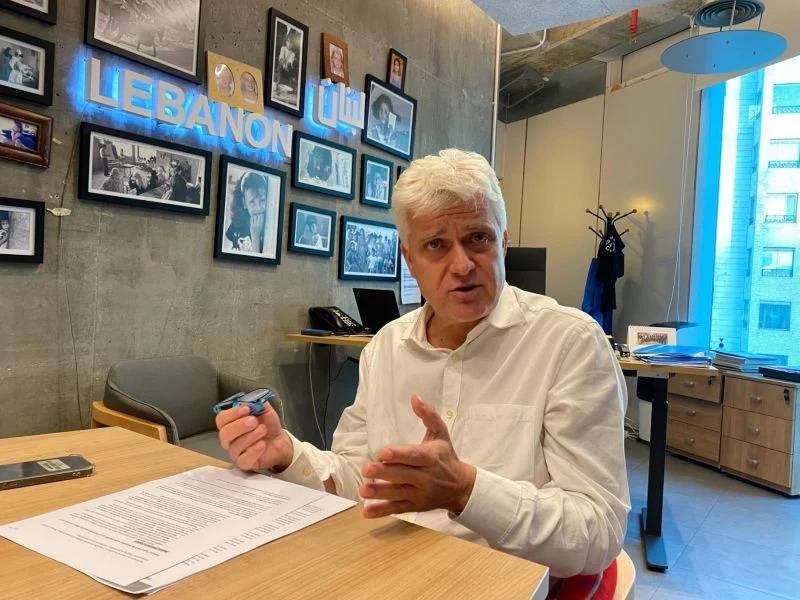
UNICEF representative in Lebanon Edouard Beigbeder. (Credit: AMH)
Although he has been in Lebanon for barely four months, Edouard Beigbeder, UNICEF’s representative in the country, is already facing a major crisis: a cholera outbreak with more than 1,447 suspected cases, including children, since early October, and that has left at least 17 dead, according to the Health Ministry.
With each passing day, the horizon looks darker in Beigbeder’s eyes. “The epidemic started in Afghanistan, before spreading to Iraq. In Iran, it has spread only slightly given the strong water systems [drinking and waste]. But since August, it has been wreaking havoc in Syria [with more than 20,000 suspected cases and 75 deaths],” he said. “It was therefore foreseeable that cholera would reach Lebanon sooner or later. Nothing could have prevented its importation.”
This is due to the constant movement of people across the Lebanese-Syrian border, and the presence in Lebanon of a large number of Syrian refugees and workers, a consequence of the Syrian crisis, some of whom have been moving back and forth between the two countries. There are some 2,080,000 Syrian refugees in the country, according to General Security chief Abbas Ibrahim.
Battling cholera with clean water
Cholera is characterized by severe diarrhea and vomiting, which can lead to severe dehydration that can kill the person infected if they are not quickly rehydrated and treated. The disease can be mild or extremely virulent. The question now is whether the epidemic will spread in Lebanon or die out.
“If the existing water and sanitation systems are working properly, cholera should die [out],” Beigbeder said, noting that it is a “disease of poor hygiene.” It is transmitted by contact, ingestion of water or food contaminated by fecal matter and therefore sewage. “[Because cholera is] waterborne, it is only with clean water, facilities, reliable sanitation and good hygiene that we can fight it,” he said.
For the moment, one can observe the rapid spread of the disease among the population, and not only among refugees. It was about such an outbreak that caretaker Health Minister Firass Abiad recently sounded the alarm, as he revealed the presence of the bacteria in the irrigation water for crops in the north of the country.
A field hospital has even been set up in Bebnine in Akkar, the location of the disease’s first outbreak in the country. Its 20 beds are already full. “If we see these deplorable health consequences in Lebanon, it is because of the lack of management of drinking water and wastewater treatment plants, and because of the lack of electricity,” the UN representative said.
Electricity shortage and collapse of the water sector
UNICEF has repeatedly warned the Lebanese authorities of the consequences of a dramatic drop in hygiene standards, a consequence of the impoverishment of a large part of the population against the backdrop of a serious economic and financial crisis.
“As early as July 2022, well before the detection of the first case of cholera in Syria, we warned against the collapse of sanitary conditions in Lebanon over the past two years, and the increase in E. coli and diarrheal infections, aggravating factors in the deterioration of child health,” Beigbeder said.
Similarly, UNICEF has repeatedly warned against the inevitable collapse of water infrastructure, writing in a recent report that “electricity shortages make it impossible to pump a sufficient quantity of water and therefore endanger the health of millions of people, especially children.”
UNICEF also stressed the need to address all the dysfunctions in the water sector. “It is just as important to motivate water officials and review tariffs upwards, as it is to ensure the good condition and functioning of drinking water and sanitation infrastructure,” Beigbeder stressed.
A few days ago the caretaker health minister called on the caretaker finance minister to keep his promise of granting civil servants in this sector “the financial aid in cash previously promised.”
In addition to these warnings, UNICEF is actively supporting the Lebanese government in its fight against the cholera epidemic and has appealed to the international community for initial funding of $29 million. This support has been concretized for the moment in the distribution of 100,000 liters of fuel to wastewater lift and purification stations in the north of the country, as well as drinking water pumping stations, to mitigate the power cuts. In addition, stocks of chlorine to disinfect water, emergency rehydration kits and medicines for hospitals and families have been distributed.
“It is thanks to UNICEF’s support that Halba hospital is able to meet the challenges” to treat cholera patients, said Beigbeder as an example. “At the same time, UNICEF has been involved for more than 10 years with the informal camps of Syrian refugees, emptying wastewater and developing drinking water facilities,” he said.
It is now up to the government to do its part. “UNICEF is only a support to the government. It is not for the organization to take the wheel,” he said, in reference to criticism leveled by health officials at UNICEF’s management of wastewater in informal Syrian refugee camps.
As the situation in Lebanon deteriorates rapidly, “the authorities must imperatively carry out the necessary water-related reforms,” said Beigbeder. The infrastructure exists, but “the system has major flaws.”
“In every crisis, an opportunity emerges,” he said, addressing the Lebanese authorities. “One has to know how to seize it.”
This article was originally published in French in L'Orient-Le Jour. Translation by Joelle El Khoury.
